|
SNAP Library , Developer Reference
2013-01-07 14:03:36
SNAP, a general purpose, high performance system for analysis and manipulation of large networks
|
|
SNAP Library , Developer Reference
2013-01-07 14:03:36
SNAP, a general purpose, high performance system for analysis and manipulation of large networks
|
#include <xml.h>
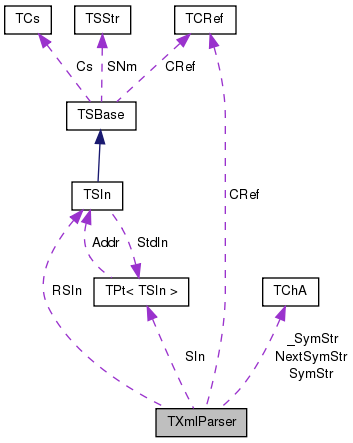
Public Member Functions | |
| TXmlParser (const PSIn &_SIn) | |
| TXmlLxSym | GetSym () |
| TXmlLxSym | GetSym (TChA &_SymStr) |
| TXmlLxSym | PeekSym () |
| TXmlLxSym | PeekSym (TChA &_SymStr) |
| void | SkipTillTag (const TChA &_SymStr) |
| TXmlLxSym | GetTag (const TChA &TagStr) |
| void | GetTagVal (const TChA &TagStr, TChA &TagVal) |
Static Public Member Functions | |
| static PXmlParser | New (const PSIn &SIn) |
| static void | GetPlainStrFromXmlStr (const TChA &XmlStr, TChA &PlainChA) |
Public Attributes | |
| TXmlLxSym | Sym |
| TXmlLxSym | NextSym |
| TChA | SymStr |
| TChA | NextSymStr |
Private Member Functions | |
| char | GetCh () |
Private Attributes | |
| TCRef | CRef |
| PSIn | SIn |
| TSIn & | RSIn |
| TChA | _SymStr |
Friends | |
| class | TPt< TXmlParser > |
| TXmlParser::TXmlParser | ( | const PSIn & | _SIn | ) | [inline] |
| char TXmlParser::GetCh | ( | ) | [inline, private] |
Definition at line 407 of file xml.h.
References TSIn::Eof(), TCh::EofCh, TSIn::GetCh(), and RSIn.
Referenced by GetSym().
{ return (! RSIn.Eof()) ? RSIn.GetCh() : TCh::EofCh; }


| void TXmlParser::GetPlainStrFromXmlStr | ( | const TChA & | XmlStr, |
| TChA & | PlainChA | ||
| ) | [static] |
Definition at line 1525 of file xml.cpp.
References TChA::Clr(), TChA::CStr(), TChA::Empty(), forever, TCh::GetHex(), TCh::GetNum(), TCh::IsHex(), and TCh::IsNum().
Referenced by GetSym().
{
static TChA EntityNm;
PlainChA.Clr();
const char *Ch = XmlStr.CStr();
while (*Ch){
if (*Ch!='&'){ PlainChA+=*Ch; Ch++; }
else {
if (*++Ch=='#'){
TChA RefChA; int RefCd=0;
if (*++Ch=='x'){
forever { Ch++;
if (TCh::IsHex(*Ch)){ RefChA+=*Ch; RefCd=RefCd*16+TCh::GetHex(*Ch); }
else { break; } }
} else { // decimal character code
forever {
if (TCh::IsNum(*Ch)){ RefChA+=*Ch; RefCd=RefCd*10+TCh::GetNum(*Ch); }
else { break; } Ch++; }
}
if ((!RefChA.Empty())&&(*Ch==';')){
Ch++; const uchar RefCh=uchar(RefCd); PlainChA+=RefCh; }
} else {
EntityNm.Clr();
while ((*Ch)&&(*Ch!=';')){EntityNm+=*Ch; Ch++;}
if ((!EntityNm.Empty())&&(*Ch==';')){ Ch++;
if (EntityNm=="quot"){PlainChA+='"';}
else if (EntityNm=="amp"){PlainChA+='&';}
else if (EntityNm=="apos"){PlainChA+='\'';}
else if (EntityNm=="lt"){PlainChA+='<';}
else if (EntityNm=="gt"){PlainChA+='>';}
}
}
}
}
}
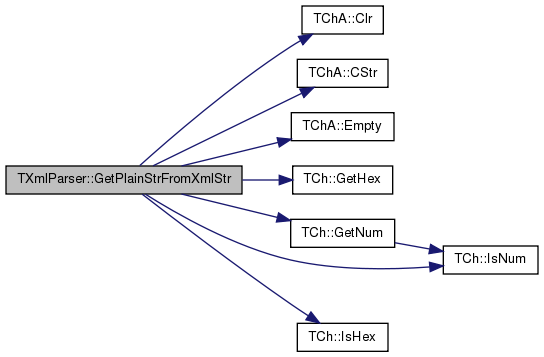

Definition at line 1451 of file xml.cpp.
References _SymStr, TChA::Clr(), TChA::CStr(), TSIn::Eof(), TCh::EofCh, GetCh(), GetPlainStrFromXmlStr(), TCh::IsWs(), TChA::Len(), NextSym, NextSymStr, TSIn::PeekCh(), TChA::Push(), RSIn, Sym, SymStr, xsyEof, xsyETag, xsySTag, xsyStr, and xsyUndef.
Referenced by GetSym(), GetTag(), GetTagVal(), PeekSym(), and SkipTillTag().
{
if (NextSym != xsyUndef) {
Sym = NextSym; NextSym=xsyUndef;
SymStr=NextSymStr; NextSymStr.Clr();
return Sym;
}
SymStr.Clr();
char Ch;
while (TCh::IsWs(Ch=GetCh())) { }
if (Ch == TCh::EofCh) { Sym = xsyEof; return xsyEof; }
if (Ch == '<') { // load tag
Ch = GetCh();
if (Ch == '/') { Sym = xsyETag; }
else { Sym = xsySTag; SymStr.Push(Ch); }
while((Ch=GetCh())!='>' && Ch!=TCh::EofCh) { SymStr.Push(Ch); }
const int StrLen = SymStr.Len();
if (StrLen > 1 && SymStr[StrLen-1] == '/') {
Sym = xsyETag; SymStr[StrLen-1] = 0;
for (char *c = SymStr.CStr()+StrLen-2; TCh::IsWs(*c); c--) { *c=0; }
}
} else { // load string
_SymStr.Clr(); _SymStr.Push(Ch);
while (! RSIn.Eof() && RSIn.PeekCh() != '<') { _SymStr.Push(GetCh()); }
GetPlainStrFromXmlStr(_SymStr, SymStr);
Sym = xsyStr;
}
if (Ch == TCh::EofCh) { SymStr.Clr(); Sym = xsyEof; return xsyEof; }
return Sym;
}
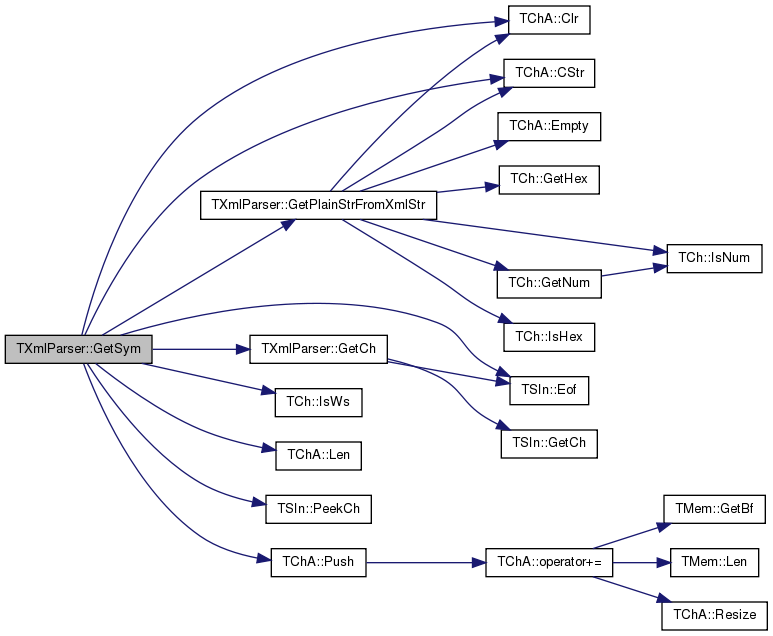
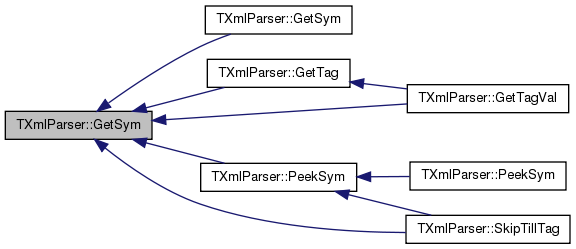
| TXmlLxSym TXmlParser::GetSym | ( | TChA & | _SymStr | ) |
| TXmlLxSym TXmlParser::GetTag | ( | const TChA & | TagStr | ) |
Definition at line 1518 of file xml.cpp.
References TChA::CStr(), EAssertR, TStr::Fmt(), GetSym(), Sym, and SymStr.
Referenced by GetTagVal().
{
GetSym();
EAssertR(TagStr==SymStr, TStr::Fmt("Expected xml symbol '%s'. Found '%s'",
TagStr.CStr(), SymStr.CStr()).CStr());
return Sym;
}
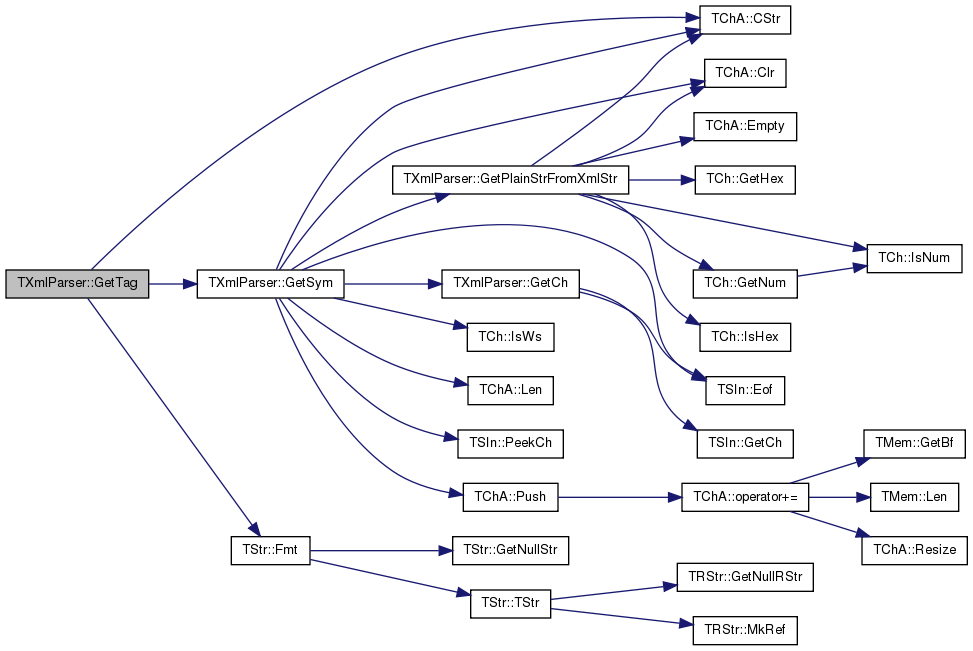

| void TXmlParser::GetTagVal | ( | const TChA & | TagStr, |
| TChA & | TagVal | ||
| ) |
Definition at line 1512 of file xml.cpp.
References TChA::CStr(), EAssertR, TStr::Fmt(), GetSym(), GetTag(), SymStr, xsyETag, xsySTag, and xsyStr.
{
EAssertR(GetTag(TagStr) == xsySTag, TStr::Fmt("Expected '<%s>'. Found '%s'", TagStr.CStr(), SymStr.CStr()).CStr());
EAssertR(GetSym(TagVal) == xsyStr, "Expected string tag.");
EAssertR(GetTag(TagStr) == xsyETag, TStr::Fmt("Expected '</%s>'. Found '%s'", TagStr.CStr(), SymStr.CStr()).CStr());
}
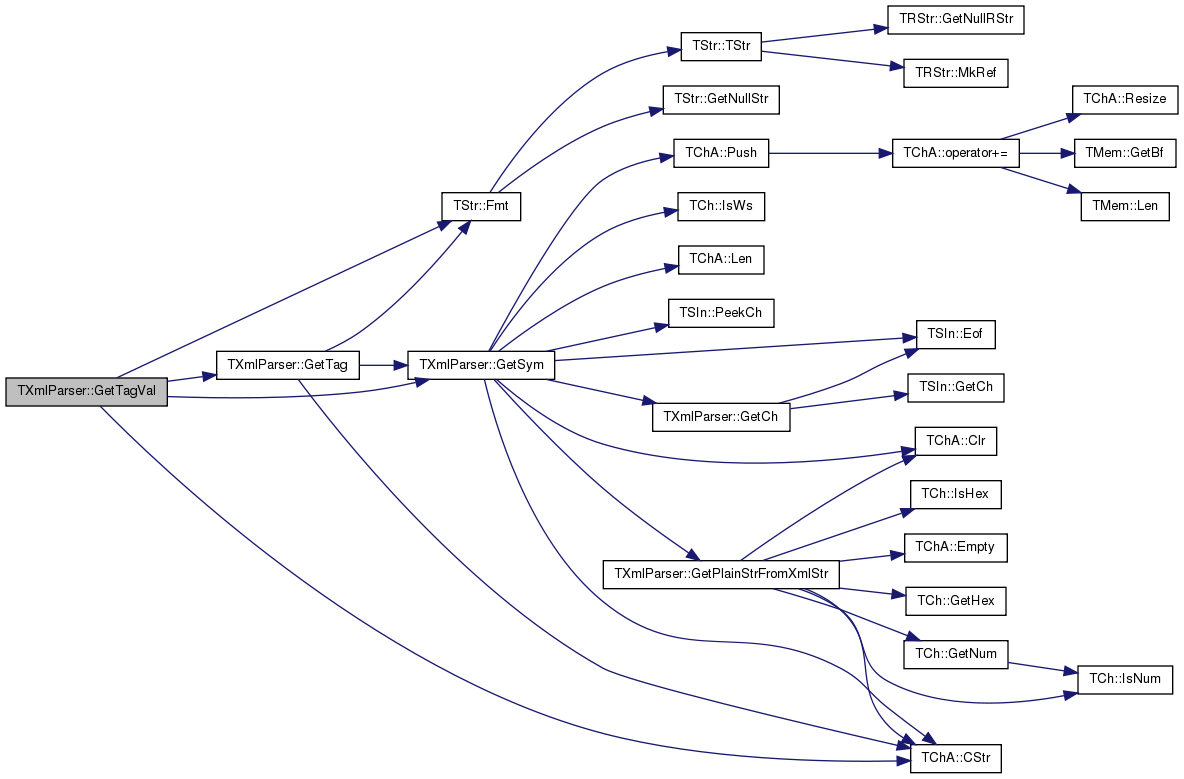
| static PXmlParser TXmlParser::New | ( | const PSIn & | SIn | ) | [inline, static] |
Definition at line 410 of file xml.h.
References TXmlParser().
{ return new TXmlParser(SIn); }

Definition at line 1487 of file xml.cpp.
References GetSym(), NextSym, NextSymStr, Sym, SymStr, and xsyUndef.
Referenced by PeekSym(), and SkipTillTag().
{
if (NextSym == xsyUndef) {
const TXmlLxSym TmpSim=Sym;
const TChA TmpSymStr=SymStr;
NextSym=GetSym(NextSymStr);
Sym=TmpSim;
SymStr=TmpSymStr;
}
return NextSym;
}
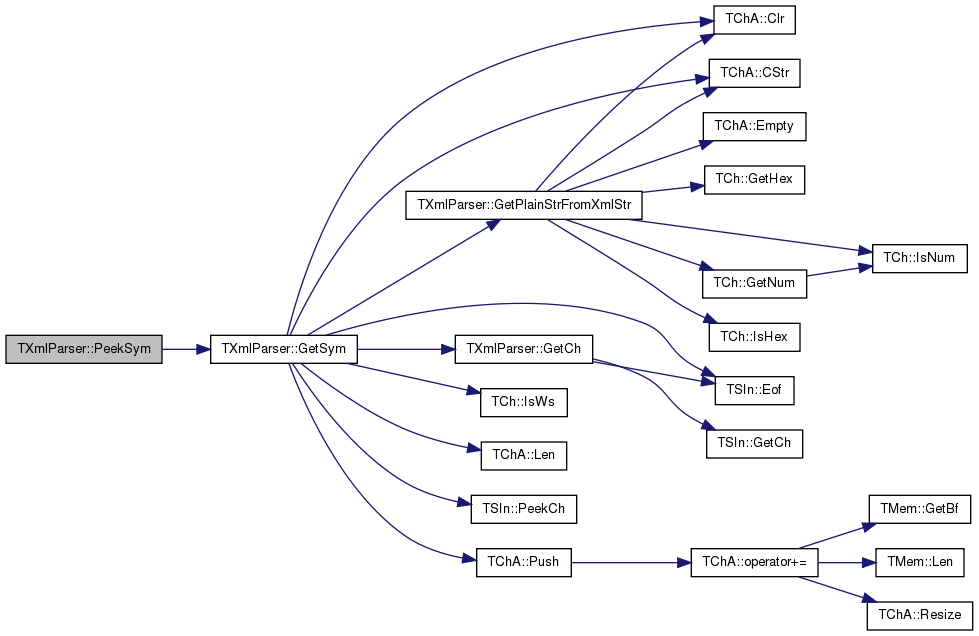

| TXmlLxSym TXmlParser::PeekSym | ( | TChA & | _SymStr | ) |
Definition at line 1498 of file xml.cpp.
References NextSym, NextSymStr, and PeekSym().
{
PeekSym();
_SymStr = NextSymStr;
return NextSym;
}
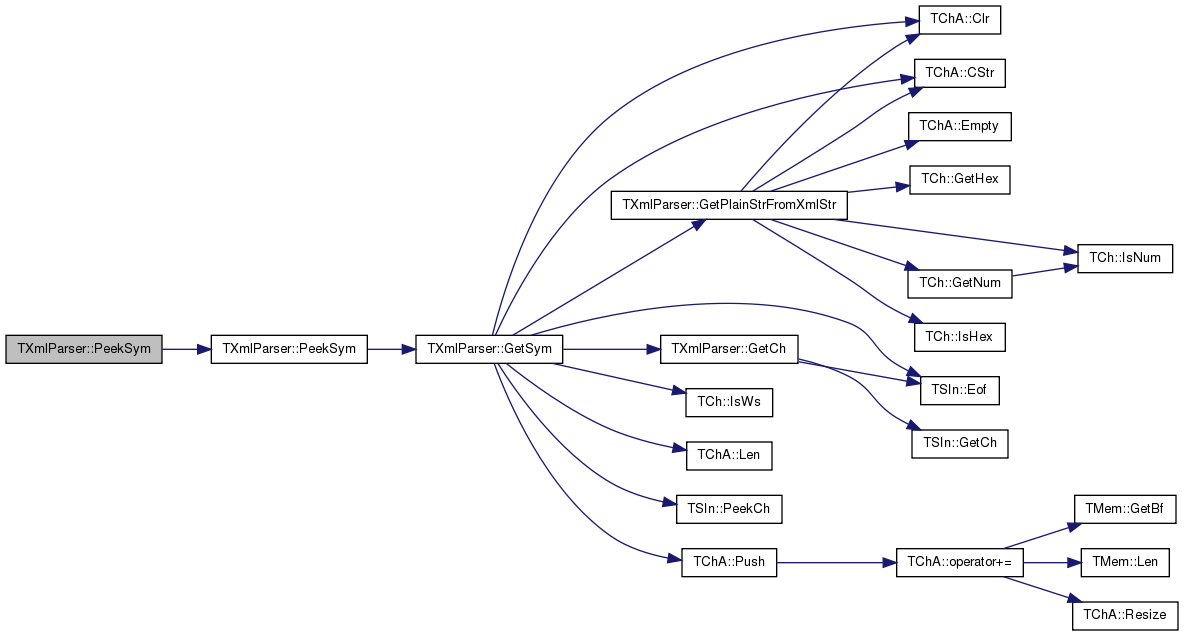
| void TXmlParser::SkipTillTag | ( | const TChA & | _SymStr | ) |
Definition at line 1504 of file xml.cpp.
References GetSym(), NextSymStr, PeekSym(), and xsyEof.
{
while(PeekSym() != xsyEof) {
if (NextSymStr == _SymStr) { return; }
GetSym();
}
}
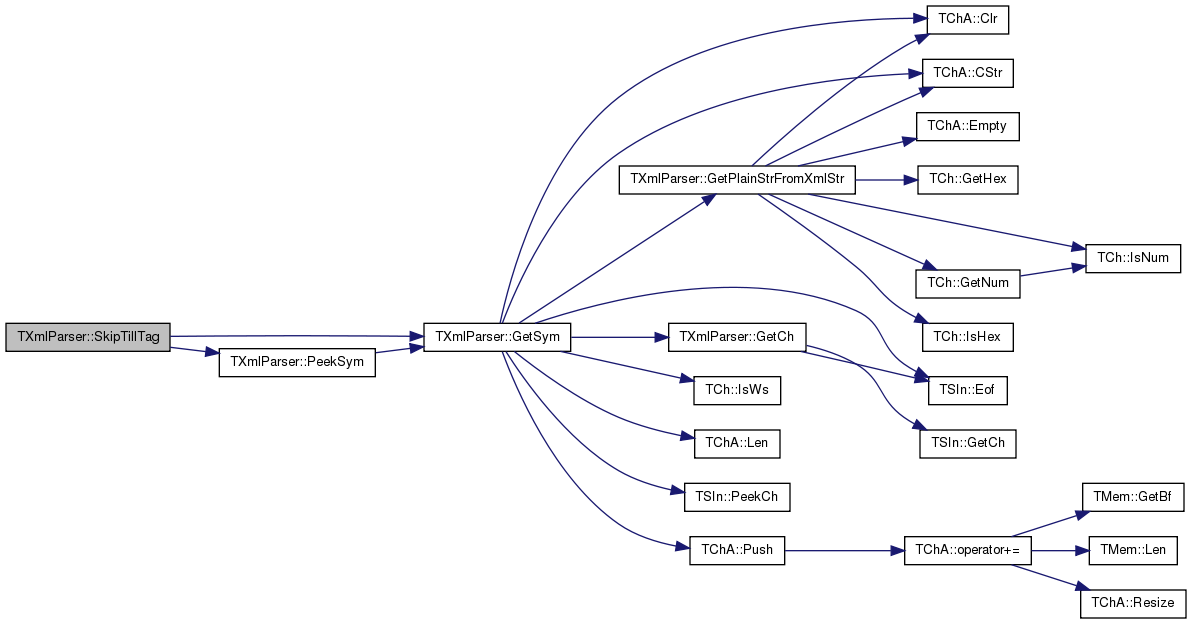
friend class TPt< TXmlParser > [friend] |
TChA TXmlParser::_SymStr [private] |
TCRef TXmlParser::CRef [private] |
Definition at line 405 of file xml.h.
Referenced by GetSym(), PeekSym(), and SkipTillTag().
TSIn& TXmlParser::RSIn [private] |
PSIn TXmlParser::SIn [private] |